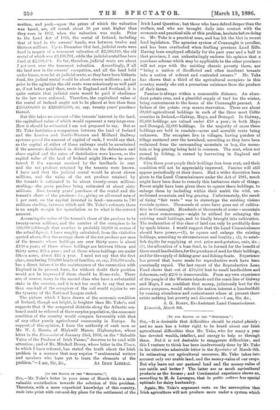[TO TER EDITOR OE TRI. 8PECTATOR.1
Tuke's letter in your issue of March 6th is a most valuable contribution towards the solution of this problem. Theorists, with a mere superficial knowledge of this country, rush into print with cut-and-dry plans for the settlement of the Irish Land Question; but those who have delved deeper than the surface, and who are brought daily into contact with the economic and practical aide of this problem, hesitate before doing so. Mr. Take is a practical man, and has hit the blot in recent land legislation. The agrarian system of Connaught is peculiar, and has been overlooked when drafting previous Land Bills. Having been employed officially for the past year and a half in that province, I can unhesitatingly endorse his opinion that a purchase scheme which may be applicable to the other provinces will not cope with the existing chronic poverty there, nor "bring a nation of disaffected and often insolvent tenants into a nation of solvent and contented owners." Mr. Take has shown that a third of the agricultural occupiers in this country merely eke out a precarious existence from the produce of their farms.
Famine is always within a measurable distance. An abun- dant potato crop, and a plentiful supply of turf for the winter, bring contentment to the home of the Connaught peasant. A failure of the potato crop means starvation. There are about 39,000 agricultural holdings in each of the three most Celtic counties in Ireland,—Galway, Mayo, and Donegal. In Galway, 35,000 holdings are valued under 210 a year; in both Mayo and Donegal, 32,000 holdings. In the majority of cases these holdings are held in rundale—acres and acreable rents being unknown. The occupiers live in villages, having patches of tillage scattered over the townland, according as they have been reclaimed from the surrounding mountain or bog, the moun- tain or bog grazing being held in common. The rent, when not earned by fishing, is earned by harvesting in England and Scotland.
Give these poor people their holdings free from rent, and their- condition will not be appreciably improved. Famine will still appear periodically at their doors. Had a wider discretion been given to the Land Commissioners under the Act of 1881, much might have been done to remedy this barbarous state of things. Power might have been given them to square these holdings, to enlarge them by including within their ambit the wild, un- reclaimed mountain and bog grazing. Unfortunately, the result of fixing "fair rents" was to stereotype the existing vicious rundale system. Thousands of acres have gone out of cultiva- tion in Connaught. Hundreds of thousands of acres—mountain and moor oommonages—might be utilised for enlarging the existing small holdings, and be finally brought into cultivation. The reclamation of this class of land can only be profitably done by spade labour. I would suggest that the Land Commissioners should have power,—(1), to square and enlarge the existing holdings, according to circumstances and locality ; (2), to estab- lish depots for supplying at cost price seed-potatoes, oats, &c. ; (3), the allocation of a loan fund, to be formed for the benefit of these small landholders, for the purchase of seed for their holdings, and for the supply of fishing-gear and fishing-boats. Experience has proved that loans made for reproductive work have been punctually repaid. The last report of the Reproductive Loan Fund shows that out of 270,000 lent to small landholdersand fishermen, only 2200 is irrecoverable. From my own experience of the people of the Western islands and the coast-line of Galway and Mayo, I am confident that money, judiciously lent for the above purposes, would return the nation interest a hundredfold by causing abundance and contentment where at present there- exists nothing but poverty and discontent.—I am, Sir, do , J. G. BARRY, Ex-Assistant Lend Commissioner. Limerick, March 9th.






































 Previous page
Previous page